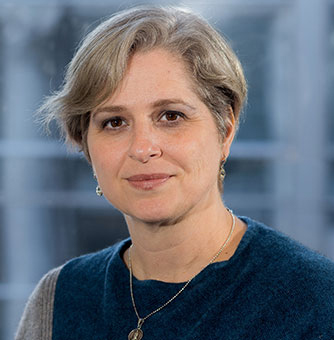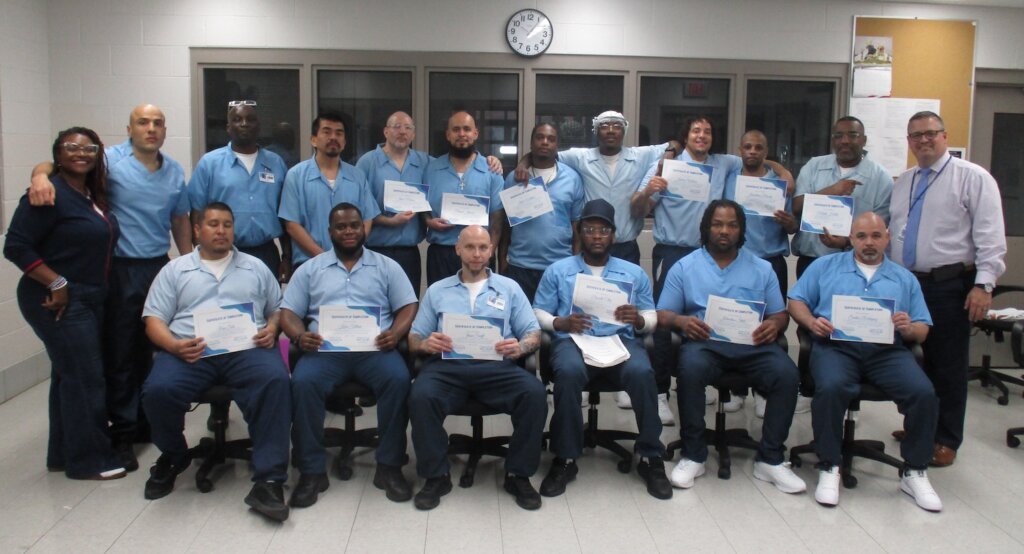Inside the walls of Pinckneyville Correctional Center, 16 men hold up their certificates to show off a new kind of transformation — becoming the first cohort of “peacemakers” through a new peer-led initiative helps incarcerated individuals break cycles of trauma and violence from the inside out.
Aptly named Creating Healing of Inside Community Educators (CHOICE), the program is a trauma-informed initiative developed by the Adler University Institute on Public Safety and Social Justice (IPSSJ). It provides weekly evidence-based and trauma-informed support sessions inside the Illinois Department of Corrections facilities — led not by outside professionals, but by individuals who are also incarcerated.
The first training was completed at Pinckneyville Correctional Center, a medium security facility in Perry County, Illinois — about 320 miles south of Chicago. The second group of graduates will soon complete their training from Murphysboro Life Skills Re-Entry Center, a minimum-security facility farther south in Jackson County, Illinois.
Now trained in evidence-informed practices, peacemakers will lead weekly workshops to help others process trauma, build trust, and create a support system behind walls. The hope: interrupt cycles of violence and incarceration through collective healing.
“Correctional facilities often lack dedicated programs or offer limited opportunities for inmates to develop essential social skills and emotional growth,” said IPSSJ Executive Director Elena Quintana, Ph.D. “This deficiency can lead to a cycle of criminal behavior, as inmates may struggle to manage stress, resolve conflicts, and maintain healthy relationships upon release. Through CHOICE, we’re addressing this challenge head on.”
According to IPSSJ, the prevalence of lifetime trauma exposure among individuals who are incarcerated is alarming. A significant portion of the incarcerated populations has experienced multiple traumatic events, including physical and sexual abuse, neglect, violence, and exposure to community violence.

According to an Illinois Criminal Justice Information Authority (ICJIA) report, 90% of men in prison have experienced at least one traumatic event in their lifetimes; 64% have experienced an assault with a weapon; 63% experienced the unexpected death of a loved one; and 61% have experienced physical assault. These experiences can — and have — profound and lasting effects on mental health, emotional well-being, and behavior, often contributing to the cycle of criminal activity.
As a result, many individuals who are incarcerated have developed trauma triggers that end up producing more issues such as coping through substance use, violence, or attempting to establish superiority over others.

The CHOICE program creates opportunities for incarcerated individuals to heal within a prison setting. IPSSJ launched CHOICE in fall 2024, thanks to a grant from the State of Illinois Department of Human Services. It sought to replicate another successful peer-led, trauma-responsive group in Danville Correctional Center that aimed to find ways incarcerated men could work together to stop people from returning to prison for violent offenses.
“Facilitating and piloting CHOICE in Southern Illinois has been one of the most transformative chapters of my journey,” said Quianya L. Enge, CHOICE regional program coordinator and facilitator. “CHOICE creates space for truth-telling, healing, and accountability, and brining that to our region has shown me what’s possible when we trust directly impacted people to lead.”
“Watching participants grow in emotional intelligence, self-awareness, and purpose has reaffirmed why this work matters,” Enge added. “CHOICE isn’t just a program — it’s pathway to liberation.”
CHOICE utilizes the SELF model (Safety, Emotions, Loss, Future), a widely used therapeutic approach to help people better understand their experiences, emotions, how they are connected to their actions. It brings the scope of the SELF model to a one-on-one, group, and peer-driven mentoring, education, and character-building context with individuals who have been incarcerated.
The peacemakers will facilitate these sessions, encouraging fellow inmates to express themselves and support each other to build an ever-expanding community.
Inmates often experience alienation, social isolation, unemployment, low educational achievement, and negative social supports. The trauma-informed approach also serves to mitigate the effects of traumatic histories.
“By building a person’s educational, vocational, and social-emotional skills — in conjunction with a community building framework — we can help mitigate the risk factors associated with incarceration and violence,” said Dr. Quintana. “It is my hope that we are able to offer CHOICE in every correctional facility in the state.”
